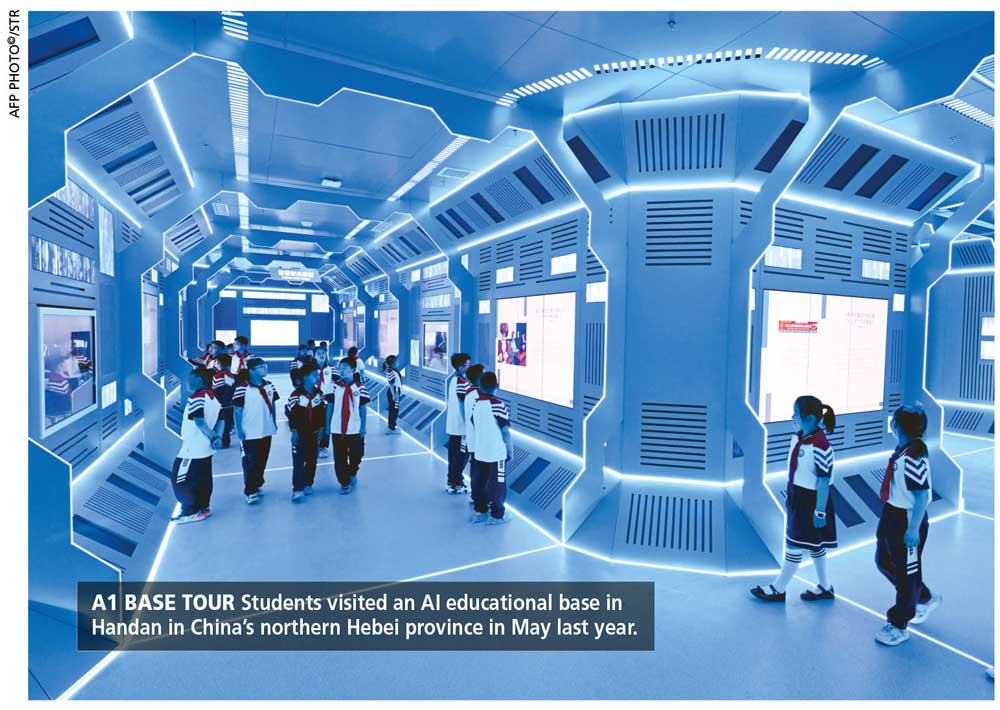RADICAL FUTURE FOR EDUCATION
Dona Senara tracks the evolution of learning in the era of Education 4.0
In the rapidly evolving landscape of the 21st century, the realm of education is undergoing a transformative shift. ‘Education 4.0,’ which describes the integration of advanced technologies in the learning process, is shaping the future of learning and teaching.
Education 4.0 is an approach to learning associated with the Fourth Industrial Revolution. It concentrates on using automation and cuttingedge technology to change education in the future. This paradigm shift goes beyond the traditional confines of classrooms and textbooks, and embraces a holistic approach that leverages the power of digital tools and AI.
The break from traditional educational methodologies is characterised by the smooth integration of technology, connectivity and individualised instruction. Fundamentally, it builds an immersive and interactive learning environment by using the potential of technologies such as augmented reality, artificial intelligence and IoT.
Unlike its predecessors, Education 4.0 transcends the limitations of time and space, and offers learners a dynamic and adaptive educational experience.
One of its cornerstones is personalised learning – i.e. a tailored approach that recognises and accommodates the diverse needs and learning styles of individual students. Through the use of intelligent algorithms, educators can analyse the strengths, weaknesses and preferences of students to create customised learning paths.
This process not only enhances the engagement and motivation of learners, but also ensures that they acquire the skills and knowledge necessary for success in the workforce of the 21st century.
Education 4.0 fosters collaborative learning by breaking down geographical barriers and connecting students worldwide. Virtual classrooms, online forums and collaborative projects enable learners to engage in real-time interaction, share ideas and work together on a global scale.
This connectedness cultivates a sense of global citizenship, and prepares students to navigate the challenges of an increasingly interconnected and interdependent world.
One of Education 4.0’s key features is the incorporation of technology. Subjects come to life through virtual and augmented reality, which provide opportunities for immersive and hands-on learning.
AI is necessary for the development of adaptive learning systems since it can provide real-time feedback and modify content to meet the needs of different learners. Smart classrooms equipped with interactive whiteboards and connected devices are creating a dynamic and engaging learning environment.
Education 4.0 places a strong emphasis on developing critical thinking and creativity, and recognises the importance of these skills when preparing students to face the challenges of the future.
Rather than focussing solely on rote learning, learners are encouraged to analyse information critically, solve complex problems and think innovatively. This shift in focus better equips them to navigate a world that demands adaptability and creative problem solving.
While the potential benefits of Education 4.0 are immense, it’s also essential to address the challenges and ethical considerations associated with its implementation. Issues such as data privacy, access to technology and the digital divide must be carefully managed to ensure that the benefits are accessible to all students, regardless of their socioeconomic background.
This education process represents a paradigm shift that promises to revolutionise the ways of learning and its approaches. By embracing personalised learning, fostering global connectivity and integrating cutting-edge technologies, Education 4.0 equips students with the skills and knowledge needed to thrive in a constantly evolving world.
As the world charts a course for the future of learning, it is crucial to remain vigilant, and address challenges and ethical considerations – so that the benefits of Education 4.0 are inclusive and sustainable.
The transformative power of Education 4.0 lies not only in its technological advancements but also in its ability to unlock the full potential of all students, and prepare them for a future where adaptability, critical thinking and creativity are paramount.






